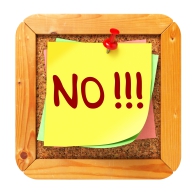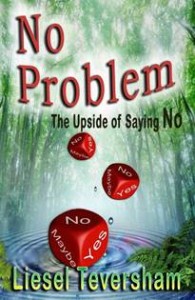
Welcome to Liesel Teversham, author of the
new book “No Problem: The Upside of Saying No!”
I remember the first time I told my husband “No.” His reply? “You don’t really mean that…”
If you’ve ever suffered from the disease of saying “yes,” keep reading…
Hi from Liesel,
 “I’d love to thank Gwenn for hosting my article as part of my 14-day virtual book tour. I’m honored!
“I’d love to thank Gwenn for hosting my article as part of my 14-day virtual book tour. I’m honored!
I met Gwenn a few years ago through getting valuable EFT DVD’s from her and after a few glitches with technology and postal services, we had to laugh and tap! We are both passionate about caring and loving for ourselves.
Gwenn’s fantastic presentation at the EFT Tapping World Summit ties right in to my topic today. Thanks again, Gwenn!”
After my book “No Problem. The Upside of Saying No” was published, I am so often asked “How can you advocate saying no? Isn’t that a terribly selfish thing to do?” This question is sometimes accompanied by a look of distaste on the questioner’s face.
I grin inside when I hear this question, simply because a few short years ago I would have been the one to frown and the thought in my head would’ve been “Eeeeuw – selfish! Not a nice person!”
Yes, I also grew up with this very ingrained idea. It’s selfish to take care of yourself, selfish to think of yourself, others should come first and you can have what’s left after they’ve taken what they need.
Through my very own (sometimes painful) life experiences I’ve learnt a few things about this approach.
WHERE DO WE LEARN SELFISH IS BAD?
As children, our parents were trying their very best to teach us manners. They wanted to let us fit in, be acceptable and develop into adults functioning well in society. My parents certainly taught me that selfish people are not liked, and if I’m going to be selfish I’ll die lonely and unloved. We learnt at a very early age that it’s expected to share or toys. “No-one likes a selfish friend,” we heard.
We learnt that we’d be loved and appreciated (conditionally) when we share our toys and by doing things for others (sharing our time and energy). Through experiences like a Mom or Dad who gets terribly angry, upset or disappointed in us if we happened to say “I’m not sharing!” we learnt it’s really not ever okay to be selfish with our belongings, time or energy. I guess the logical deduction in a child’s mind is “I have to share everything – my stuff, my whole self.”
Not everyone grows up with this type of conditioning. Beliefs about life, ourselves and others are formed in the vulnerable minds of kids (especially under 6 years of age). They’re in a hypnogogic state until then and they take in everything that happens as “the truth”. Children have no filters to discern “parents’ beliefs” from “what’s actually true” and therefore, everything Mom or Dad does or says, goes in as fact.
When we get strong childhood messages about sharing (like seeing an angry Mom’s face in front of us when we say “I want to play with my own toy, Johnny can’t have it”), our young impressionable subconscious mind could form a belief like “I can’t have what I want”, “I’m unworthy of love” or “Others are more important than I am.” These beliefs make self-love quite a challenge.
Once a belief is formed, it’s not that easy to stop it from influencing us. The belief lives in our powerful subconscious mind (which dictates a huge 97% of how we approach life!) until we can find a way to clear it out. Powerful ways to clear out old beliefs that no longer serve us, are EFT or The Sedona Method.
Did you receive similar messages as a child, even in subtle ways? Chances are then that you could have powerful beliefs around being selfish. And that the only way to be lovable is to share your toys (belongings or money as an adult), your time and energy (doing things for others) and that you’ll be punished in some way if you dare want your belongings or other resources for your own use.
WE’RE LIKE CUPS
Each of us is like a cup that can hold a certain amount of resources.
In this moment, we have a limited amount of time, money and energy. (Yes, we can argue that we live in an unlimited, abundant universe. It’s a topic for a different article!). For now, please go with these ideas.
We have 24 hours every day, our bodies generate or provide us with a certain amount of energy every day, and we have a certain amount of money in the bank at this moment.
If we keep giving out our resources to others in the interest of “not being selfish”, it’s like we’re emptying our cup without putting back in. At some stage the cup will finally be empty.
Trying to avoid “selfish” is like saying “I’ll just keep emptying my cup until there’s nothing left” because no-one will like me if I don’t want to give them what’s in my cup.
Here’s the thing. It’s a really short-term strategy. Eventually, when our cup is empty, we feel exhausted, resentful, abused, overwhelmed, frustrated, angry and resentful. We may end up with a physical illness like Chronic Fatigue Syndrome or Fibromyalgia. Our cup is simply empty and there’s nothing left to give to anyone else, least of all ourselves. The energy tank has been depleted because we’ve been trying to be good girls or boys by avoiding “selfish”.
FILL THE CUP PERIODICALLY
If we take time out to fill the cup while it’s not yet empty, our resources can be replenished. We never have to get to “empty”.
What if we could sometimes say, “I’m sorry, I’m not able to help you this time. My own cup is a bit empty right now and I won’t be able to do my best for you. I am taking a weekend off to replenish and then my cup will be full again. I’d love to help you when I’m full again. How about in 2 weeks’ time?”
That means it’s not “no” forever. You’ve let them know that they’re important to you, and you want to do it well for them, plus you’ve provided another option.
SELFISH VS SELF-CARE
I like to replace the concept of “selfish” with “self-care”. Self–care means that we keep filling our own cup, regularly, so that we can serve others from the overflow.
Serving in that way (helping others, supporting them, giving them what they need) when our own cup is full, happens in a joyful way. When we feel fulfilled, replenished, energetic and enthusiastic because we’ve filled our own cup first, life feels wonderful. We can serve others feeling great and grateful to be of service.
LEARN TO FILL YOUR OWN CUP
1. How full is your cup right now?
2. If you’re running low, how can you fill that cup today? What is one simple thing you could do to start filling up again?
3. A great question to ask is “What do I NEED today?” It can be simple – it doesn’t have to take hours. Sit on a blanket on the lawn and stare at the clouds for 10 minutes, with a delicious steaming beverage.
4. What can you put in place to make sure you fill your cup as a matter of course, and not only when you’re already in crisis mode?
5. If your cup is relatively empty right now, could you find a kind way to tell the next person who makes a request that you need to refill your own cup so that you can serve them in the best possible way later? You’d be surprised what happens to your self-esteem when you start setting boundaries in a gentle way.
© Liesel Teversham 2014, All Rights Reserved
ABOUT LIESEL
Liesel Teversham (B. Mus Hons) is the author of “No Problem: The Upside of Saying No,” an EFT guidebook for those who are overwhelmed, exhausted and resentful and never have a moment for themselves.
Visit her book blog to see the full schedule for the Virtual Book Tour at www.no-problem-book.com/index.php/book-tour to receive exciting free gifts, including a including a free 10 lesson e-Course to accompany the book, available on Amazon.
Liesel is a coach, trainer and speaker helping professional women to implement guilt-free self-care strategies.
Tags: EFT tapping, Self-love

Leave A Reply (No comments so far)
The comments are closed.
No comments yet